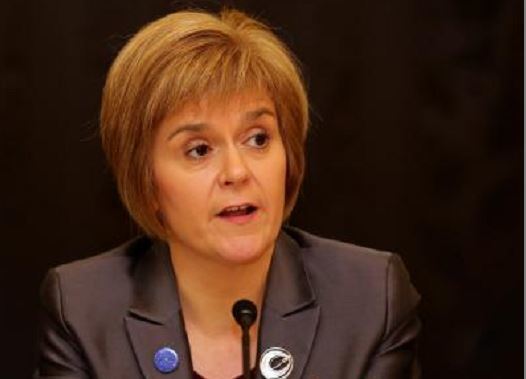
There’s always one politician who can inflame passions in Scotland, even if she does it from the grave.
Margaret Thatcher may have been lauded in many parts of the world, but became loathed closer to home as the U.K. prime minister who shut Scotland’s heavy industry in the 1980s.
The Scottish nationalists are evoking that toxic legacy as they clash with another female Conservative leader over Scotland’s right to stage a second independence vote because of Brexit. The narrative is that the nation is being suppressed yet again and disrespected by the latest incarnation of Thatcher.
The intention is that, as the dispute with Prime Minister Theresa May drags on, the opinion polls will turn in their favor. Memories of the “Iron Lady,” who led Britain from 1979 to 1990, are woven into the nationalist psyche and tales of job losses and strikes are passed on through the generations.
“Everyone knows what happened in those days: it was a sore time for a lot of people so they are still angry today,” said Malcolm Mitchell, 24, an activist from Glasgow attending the Scottish National Party conference at the weekend. “We’ve got our own Margaret Thatcher in Theresa May. She’s filled that void.”
‘Bad Old Days’
Ever since Britain split over Brexit last June — with Scotland voting to remain in the EU — Scottish First Minister Nicola Sturgeon and her SNP have rounded on the “hard-right Tories” and tapped into a bitter history. The government in London, again, is ignoring the will of the Scottish people, they say.
“It’s like going back to the bad old days of Margaret Thatcher and it didn’t do the Tories many favors in those days,” Sturgeon, who runs the semi-autonomous government in Edinburgh, told the BBC last week after May rebuffed her road map for another independence vote between the fall of 2018 and spring of 2019.
Her deputy, Angus Robertson, repeated it. If May doesn’t relent it “will be the proof that the Tories have returned to the bad old days of Thatcher’s Britain running roughshod over Scotland,” he told the SNP conference in Aberdeen.
George Reid, a former presiding officer of the Scottish Parliament, even referred to Thatcher instead of May as he spoke at a fringe event at the SNP gathering.
The Scottish Parliament is scheduled to debate Sturgeon’s plan Tuesday with a vote on whether to back it on Wednesday.
Grievance Politics
For May, it’s an opportunity to benefit from a tougher line on Scotland in her England heartlands where polling shows there’s resentment about perceived special treatment for the Scots.
During the independence referendum in 2014, the SNP blamed the opposition Labour Party for being “in bed with the Tories” as former Prime Minister Gordon Brown and former Chancellor of the Exchequer Alistair Darling defended the three-centuries-old union.
“We have a culture of territorial grievance that works from the periphery to the core and the core to the periphery,” said Richard Wyn Jones, professor of politics at Cardiff University. “It’s important to remember that this isn’t some big Coca Cola advert where everyone stands holding hands.”
While nationalist ministers and lawmakers are keen to show it’s not about resenting the English and shouting down the merits of keeping the United Kingdom intact, attacking the Tories tends to play well in Scotland.
Dangerous Game
The nationalists lost 55 percent to 45 percent in 2014, but rather than petering out, the SNP then added scores of supporters to take membership as high as one in every 35 Scottish voters. Less than a year later, Labour was decimated in Scotland in the U.K. election as the SNP won all but three seats.If there’s another independence vote — whether according to Sturgeon’s calendar or May’s — the opposing campaign can’t be left to May’s Conservatives, said Ian Murray, the only remaining Labour lawmaker for Scotland in the U.K. Parliament.
“The SNP is trying to frame this as Scotland against the Tories,” he said at his office in Edinburgh earlier this month. “That’s incredibly dangerous.”
Most polls show support for independence hasn’t risen, not least as the economy has lagged the rest of the U.K. and the North Sea oil revenue that was supposed to underpin an independent Scotland dried up.
Thatcher’s Children
The standoff is in Sturgeon’s DNA. A child of the Thatcher years, her mantra has always been that Scotland has been dictated to long enough by Tory governments in London. Thatcher introduced her controversial “poll tax” for Scots a year before England, a fact Sturgeon frequently recalls.
“The days when they could impose the poll tax, destroy Scottish industry and deny all demands for constitutional change, well, the prime minister should understand this point and understand it well,” she said in her conference speech on Saturday. “Those days are gone and they are not coming back.”
The theme of “democratic deficit” that brought Sturgeon, 46, to the SNP has been compounded by Brexit, she says. Indeed, it was a central vibe among the roughly 2,500 delegates at the party’s gathering in Aberdeen.
Over drinks and chatter in the corridors of a conference center on the North Sea coast, the mood was defiant. As Keith Brown, the SNP minister responsible for the economy in Scotland, put it: This debate comes down to Scotland versus the Tories.
Like the 1980s, “there are people feeling disempowered by the policies of a Tory government they didn’t vote for,” said Graeme Sneddon, 25, another SNP member from Glasgow. “There are obvious parallels to the modern day situation.”
Recommended for you
